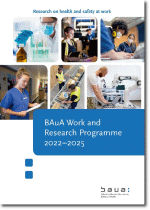To complement the research financed out of its own budget, the Federal Institute for Occupational Safety and Health (Bundesanstalt für Arbeitsschutz und Arbeitsmedizin, BAuA) also competes nationally and internationally for third-party funding. BAuA pursues a range of goals with its third-party-funded activities, for instance giving the study of safety and health in the world of work a higher profile in academia, encouraging up-and-coming young researchers, and anchoring BAuA in the science system.

Its commitment to third-party-funded research not only enables BAuA to broaden its resource base, but also to network proactively with university and non-university research partners. All the Institute’s projects with third-party funding support the objectives and tasks defined in BAuA’s main strategic document, its Work and Research Programme. The framework for their targeted, quality-assured, process-driven implementation is laid down by the Institute’s internal third-party-funding strategy.
In the last few years the Institute’s principle funding providers have been the Federal Ministry of Education and Research (Bundesministerium für Bildung und Forschung, BMBF) and the EU’s key research funding programmes (Horizon 2020, Horizon Europe). In 2022 BAuA took part in twenty-five ongoing projects with third-party funding.
Three recently approved third-party-funded projects are discussed below.
German Centre for Mental Health
The German Centres for Health Research are large research alliances funded by the BMBF with the aim of improving the treatment and prevention of common conditions like cancer and cardiovascular, metabolic, infectious, lung, and neurodegenerative diseases. The new German Centre for Mental Health (Deutsches Zentrum für psychische Gesundheit, DZPG) was established in 2022 following a two-stage competitive process. The DZPG brings together various scientific disciplines (above all psychiatry, neuroscience, social medicine, public health, and psychology) at six sites across Germany to do research into mental diseases and further develop therapeutic and preventive approaches.
BAuA is one of the partners working at the Bochum site, which is led by the Ruhr University Bochum’s Mental Health Research and Treatment Center. The Bochum team is distinguished by its orientation towards clinical psychology and its focus on different life worlds, such as the family, school, and work. The expertise BAuA has built up over many years on the correlations between work and mental health will be brought to bear on these concerns.
Beautiful
Apart from reliable technologies, it is control centre personnel in particular who, with their extensive experiential knowledge, guarantee the safe operation of gas and power grids. The BMBF is funding the Stress-optimized Work Design for Critical Infrastructure Network Control Centres (Beautiful) project, the purpose of which is to improve working conditions for personnel at the control centres that manage our critical infrastructure. BAuA is contributing by conducting a specialised sub-project.
Under Beautiful, an interdisciplinary consortium is addressing the challenge of developing high-performance assistance systems for ever more demanding monitoring and management tasks. Such assistance systems are intended to support safe decision-making in complex situations under extreme time pressure. The hope is that transparency and trust in these systems will be boosted by carrying out standardised assessments of the added value they deliver for control centre personnel.
HumanTech
The European construction industry faces a number of challenges, such as raising productivity, enhancing workplace safety and health, and making the transition to greener, more sustainable processes. The Human-Centred Technologies for a Safer and Greener European Construction Industry (HumanTech) project is funded by Horizon Europe and intended to develop new concepts that help the sector tackle these challenges in appropriate ways.
The HumanTech project is rooted in a human-centred approach that takes account of the capabilities offered by innovative wearable devices and smart robotics. These technologies are designed to support employees or facilitate human-robot collaboration on work tasks. BAuA’s contribution will consist in assessing relevant technologies from an ergonomic point of view. As part of this, there are plans to carry out iterative surveys of the levels of acceptance these technologies enjoy. The first stage will involve interviewing trial participants, but further investigations are to be conducted in real workplaces, allowing practically grounded results to be reached.
MACRAMÉ
The Horizon Europe-funded project Advanced Characterisation Methodologies to assess and predict the Health and Environmental Risk of Advanced Materials (MACRAMÉ) is seeking to develop harmonised, standardised characterisation and testing methodologies. BAuA is a member of this consortium.
The methodologies to be developed will be important both for occupational safety and health and for the coherent system of regulation aspired to under EU chemicals safety legislation. At the same time MACRAMÉ is expanding the previous focus of the Malta Initiative and the NanoHarmony and Gov4Nano projects, which have primarily concentrated on simple (metal oxide) nanoparticles. With its studies of fibrous and 2D materials, MACRAMÉ will therefore provide important inputs to the regulatory regime that is envisaged, which will give adequate and comprehensive consideration to morphologically determined health risks.
F 2512, NanoHarmony - Towards harmonised test methods for nanomaterials - BAuA contribution
F 2477, Implementation of risk governance: meeting the needs of nanotechnology
